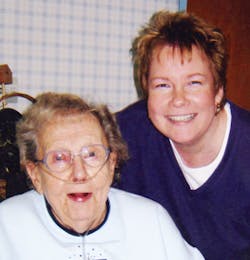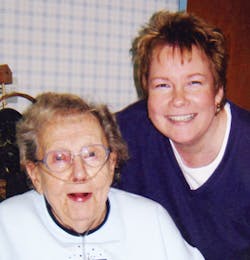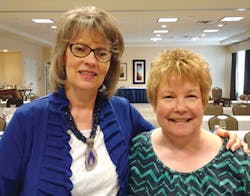What are we going to do with Mom?
By Dianne Glasscoe Watterson, RDH, BS, MBA
One of the challenges facing many baby boomers today is caring for aging parents. When parents become too ill or incapacitated to take care of themselves and live independently, the job may fall on the shoulders of grown children. However, with our current national economic situation, it often takes two incomes to keep a household running. Sometimes, difficult decisions have to be made that often involve tremendous sacrifice. The good news is that being a dental hygienist may help prepare one to become a caregiver. This is the story of a dental hygienist who gave up her career to be the caregiver for her terminally ill mother.
A little background
Suzan (Sue) Chopik became a dental assistant in 1973. She loved assisting but longed to treat patients and have her own schedule. So dental hygiene was a natural evolution for her. Sue graduated in 1979 from Prairie State College with a dental hygiene degree. She practiced continuously until March 2012.
Sue's mother loved to smoke. In 1980, after several unsuccessful attempts, she finally quit. However, much damage had already occurred. She developed COPD, congestive heart failure, and osteoporosis. (She was also visually impaired.) Sue's mom went on oxygen in 1991. She had an oxygen concentrator at home and portable oxygen tanks for when she went out. She was ambulatory until the latter half of February 2012. Her health had deteriorated to the point that she knew death was imminent. It was her wish to stay at home until she died. She began hospice care at home on March 4, 2012.
Sue's dad became Mom's primary caregiver, and as their only child, Sue was his assistant. Three or four times a week she would drive from her home in Lenox to their home in Oak Lawn to give him a break (about an hour each way), and help out any way that she could. Every visit, she would give her mom a foot and leg massage for about an hour. "Mom loved it!" After two years, the day-in, day-out, 24-hour-a-day care required of an 86-year-old primary caregiver became overwhelming. Mom became incontinent, and looking back, Sue thinks this was what pushed her dad over the edge.
----------------------------------------------------------------
Other articles by Watterson
- Top reasons hygienists are sued
- The Role of Diet in Oral Disease Prevention
- 6 ways to reduce cancellations and broken dental appointments
----------------------------------------------------------------
Sue said, "It was just too much for him. Dad called me one evening, upset and sobbing, and told me that he ‘needed a miracle.' That sleepless night I prayed and pondered every option I could think of. It was clear that I needed to take a leave of absence to help them through this. I stopped practicing mid-March 2012."
Sue had been working at Homewood Flossmoor Dental Care for 18 years. Previously, she had spoken with her boss, Dr. Flor, about the possibility that at some point she might need to take a leave of absence to help her parents. She never thought things would get so bad so quickly. Basically, she came in on Monday morning and announced that she needed to leave the next day. Dr. Flor wasn't working that day, so he found out when Sue called him at home from the office. The doctor was very kind and understanding. He told Sue to do what she needed to do, and that her job would be waiting for her when she was ready to return.
A typical day
In the beginning, Sue's life was much like being a live-in health-care aide. Sometimes she would stay overnight; other times she would go home. Sue's mom had always been the homemaker. She was the one who cooked, cleaned, did the laundry, shopped, and paid the bills. Being old-fashioned, Sue's dad often said, "I had no idea how much time women's work took!" During the 39 months of her mom's confinement, Sue's dad had to step up in ways that he never could have imagined.
Sue's mom spent most of her time in a power-assisted recliner. Her chair was modified for her comfort with pillows and covered with two bath towels to keep it fresh. Wake up, shower, dress, and prepare breakfast. Wake up Mom, help her out of her chair, and walk to the bathroom. Toileting. Comfort bath. Fresh nightgown (she lived in them) and robe. Help her walk to the kitchen. Eat breakfast, and then help her return to her chair. Make her comfy, cover her with a blanket, place fresh ice cubes in her cup, and make sure that the phone and tissues were nearby. Empty the garbage, check the cannula, and change the TV channel. She liked to have the TV on all the time. Do the dishes, check on Mom, do the usual homework. Check on Mom. Give meds. Lots of meds. Do the nebulizer. Check the water level in the oxygen concentrator. New cannula or tubing necessary? Greet and assist the folks from hospice when they came. Hair care, manicures, pedicures. Lunch -- same routine. Afternoon leg and foot massage. Dinner -- same routine. Bedtime toileting, wash-up, good nights, and go to bed.
COPD is a chronic, progressively debilitating disease. One dental complication was that Sue's mom couldn't chew well. She had lost so much weight that her dentures didn't fit properly. She also lost her sense of taste and smell. When Sue began caregiving, her mom could feed herself. Toward the end, she could not. Sue and her dad would feed Mom small pieces. S-l-o-w-l-y. Whatever she liked.
Sometimes Mom would confuse night and day. Chronic sleep deprivation is not a good thing. Then there was the issue of role reversal. Sue became the parent and the parents became the children. Sue noticed that as her parents aged, they became childlike, only with adult reasoning and communication skills. One day Sue realized that they needed her to look out for their safety and highest good. Even so, the day-in, day-out monotony was challenging, both physically and emotionally.
Dental hygienists are natural caregivers
Sue feels her dental hygiene career has served her well in her role as a caregiver, given the many skills that she had developed in her professional career. Dental hygienists are caregivers to husbands, children, families, patients, communities, friends, neighbors, and pets. Hygienists are good with people and care about doing things right. Dental hygienists are detail-oriented, work well under pressure, have a good sense of humor, and can keep a good poker face when necessary.
Hospice supports those facing end-of-life issues with a multitude of specialists: physician, nurse practitioner, nurse's aide, pharmacist, phlebotomist, social worker, and chaplain. Sue spoke their language. It helped that she could take vitals and watch for signs of distress. Sue states that even her psychology classes came in handy at times.
How being a caregiver affects the family
Although Mike and Sue were never blessed with children, Sue's caregiving strained their marriage.
Sue said, "Even though I wasn't around very much, I was still Mike's wife. He ate a lot of meals by himself. We didn't have much of a social life. We missed our couple friends. When I was home, I was busy catching up or just wanted to sleep. Mike was incredibly understanding; he was my rock! Mike let my time be their time.
"As a dental hygienist, I'd go to the office, do my thing, and go home. Caregiving was totally consuming 24/7. Their home or mine. Everywhere I looked, I saw work to be done. It is tough to keep two households functioning at the same time. Sometimes I just wanted to leave … but where would I go? I felt isolated from Mike, my friends, and my career. I missed my colleagues, my patients, and my paychecks!
"Caregivers have a tendency to put themselves last on their lists, and I was no different. People tell you, ‘You have to take care of yourself. If something would happen to you, what would happen to them?' This is troublesome, and much easier said than done. Occasionally, I'd take a day or two off, but I knew how difficult this was on Dad, so I didn't do it very often."
A very precious memory
Sue observed that, toward the end, her mom spoke very little and slept a lot. When she would become agitated and restless, Sue found that massage soothed her like nothing else. One afternoon, while Sue was massaging her feet and legs she said, "You don't have to rub hard; just your touch is enough. You have good energy." Really, Mom? A 91-year-old talking about energy? Sue was speechless … and totally amazed.
During her mom's confinement, Mom was teaching Sue some important final lessons. One such lesson is that even when one is terminally ill and confined with a multitude of afflictions, one still has something of value to give! Mom was always thankful. She never complained. She always said "please" and "thank you." She smiled. She laughed. Sometimes she would say, "I love you, love you, love you." Sue lived for that! Through it all, Sue's mom lived in peace with grace, gratitude, and dignity.
The "new" normal
Although Sue and her dad saw the end was coming, Mom's death still hit them hard. She was their ministry. They are still trying to find their "new normal." All the same, their lives are forever changed.
Sue's dad is 88, and both his mind and body are showing deficits that need to be addressed. He is alone for the first time in 63 years. Will he keep the house? Is it too much for him to care for? Would assisted living be a good choice, perhaps one with progressive care? These are questions that will demand answers in the near future.
As for Sue, she is looking forward to returning to dental hygiene. She and her dad are physically and emotionally exhausted, and caregiving has taken a toll on home, marriage, friendships, and family ties. She looks forward to some time away to renew and refresh.
DIANNE GLASSCOE WATTERSON, RDH, BS, MBA, is a professional speaker, writer, and consultant to dental practices across the United States. Dianne's new book, "The Consummate Dental Hygienist: Solutions for Challenging Workplace Issues," is now available on her website. To contact her for speaking or consulting, call (301) 874-5240 or email dglass [email protected]. Visit her website at www.professionaldentalmgmt.com.
The most valuable lesson
Sue shares how being a caretaker has changed her:
"The past two months have been the most difficult of my life, but they were also a privilege. The woman who prepared my place in this world let me see her leave it. Mom got her wish; she died peacefully, at home with her family at her bedside. Now I'm a lot gentler with others and myself. I'm a lot more tolerant and respectful of others who do things differently than I do. I have a much better idea of what is really important … and what is not. I know that people matter more than things, and that the smallest act of kindness is better than the grandest intention. Sometimes words are not necessary; just to sit in silence and be with a person is enough. I truly appreciate that we really are just here for a little while. I now know that you can choose to be happy despite your circumstances. And, just like Mom said, this quote from Winnie the Pooh is true: ‘If ever there is tomorrow when we're not together … there is something you must always remember. You are braver than you believe, stronger than you seem, and smarter than you think. But the most important thing is, even if we're apart … I'll always be with you.' "
Lessons from Sue's mom
Sue's mom proved that you can choose to be happy. And that although you can't control everything that happens to you -- you have complete control over how you react! One of Sue's favorite quotes is "Nothing is so strong as gentleness and nothing so gentle as real strength." (Saint Francis de Sales) Her mom had the ability to accept her circumstances without complaint or bitterness.
And a final note from me: Thank you, Sue Chopik, for sharing this most challenging and personal time of your life with your dental peers. Your words are filled with inspiration and hope for those who are involved in caregiving right now. Your insights may become invaluable for those of us who will travel this same road of caregiving with our own parents in the future.
Past RDH Issues


